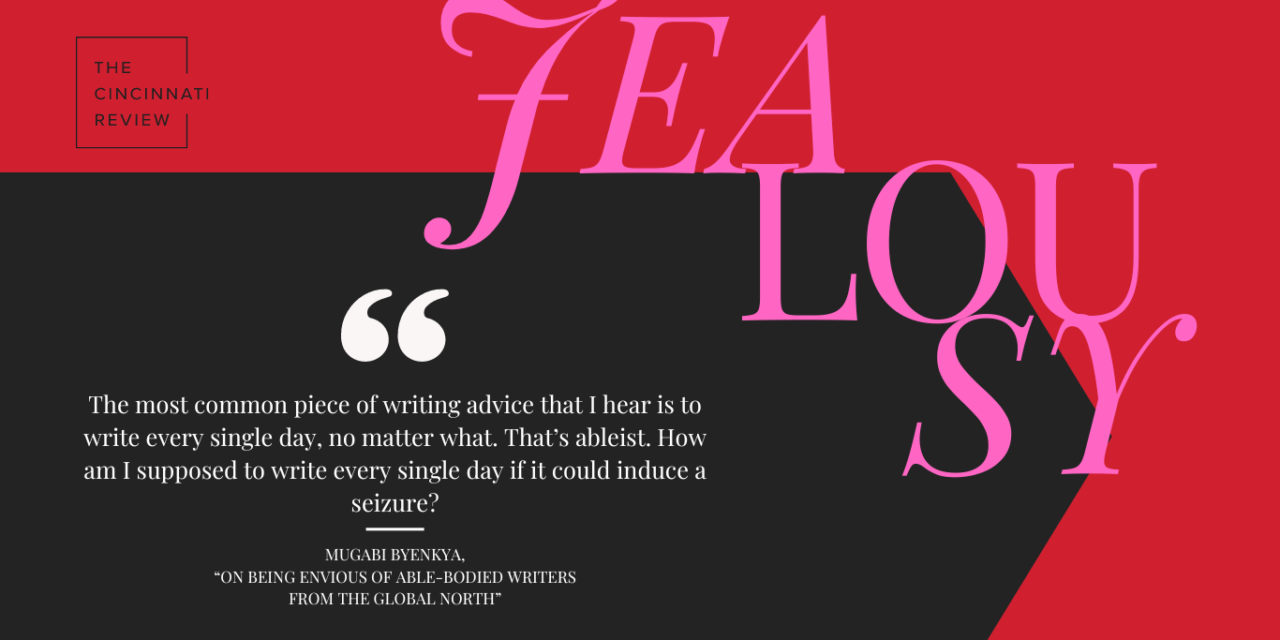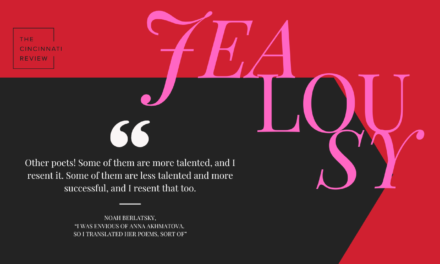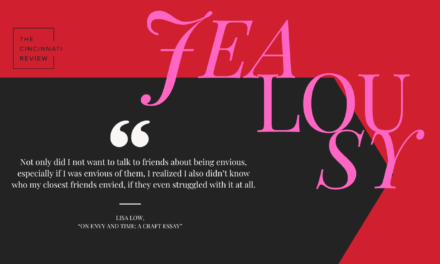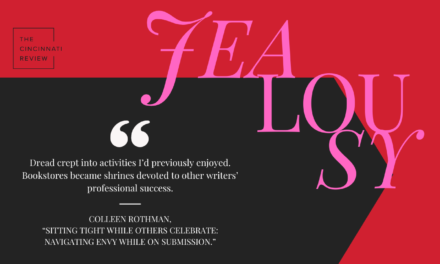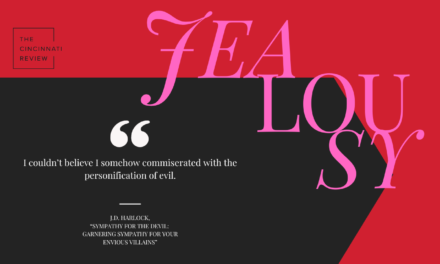To accompany our spring 2024 issue (21.1), we have curated a folio on jealousy and envy. Reading Ravi Mangla’s story “Flavors of Tuscany” in particular inspired us to put together this feature. We initially called it just a “jealousy” feature, which describes what happens in Mangla’s story, but we then expanded it to cover the concept of envy. Though most dictionaries have accepted that jealousy and envy are used nearly synonymously in our culture, the Chicago Manual of Style says, “Jealousy connotes feelings of resentment toward another, particularly in matters relating to an intimate relationship {sexual jealousy}. Envy refers to coveting another’s advantages, possessions, or abilities {his transparent envy of others’ successes}.” For the most part, we follow that formulation of the terms.
Here is Mugabi Byenkya’s contribution to that folio:
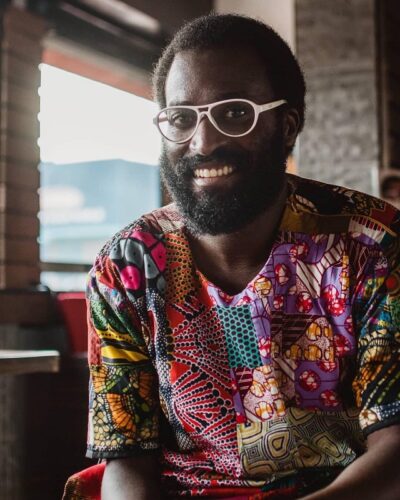
photo by Muhammad Kanchu
On Being Envious of Able-Bodied Writers from the Global North
Today I woke up and was immediately wracked by:
- An agonizing burning sensation all over my body, from head to toe, one of the manifestations of my chronic pain;
- the violent feeling of my body being crushed into a vice, another manifestation of chronic pain;
- a harrowing chronic headache that might ramp up to a migraine;
- excruciating spasms that I have to consciously suppress or they’ll overwhelm me and develop into a full-blown seizure;
- hyperacusis, a reduced tolerance to sound, so that ordinary noises are too loud, while loud noises cause searing pain;
- spasticity on the right side of my body.
I woke up at 5 p.m because I had difficulty falling asleep last night, like I do every night when I’m flaring. A flare is an exacerbation of my chronic illnesses to excruciating levels, rendering me largely bedbound, completely homebound, and incapable of mental or physical activity without triggering a seizure (even things as minuscule as responding to a text message or taking a shower). I’ve been flaring for the past two months. I’m in bed as I write this. It’s next to impossible to fall asleep during a flare thanks to painsomnia (chronic-pain-induced insomnia) and night-onset seizures. I take four different medications every night to help me fall asleep. When I’m not flaring, they usually work within an hour or two. When I am flaring, results may vary.
When I do eventually sleep, I experience the one respite from my disabilities: dreams. In my dreams I’m doing everything I wish I could do but can’t. I’m not necessarily able-bodied, but I’m at the peak of my health, like I was during university, able to handle a weighty course load, pursuing two degrees at the same time, working at a rigorous part-time job, taking part in extracurricular leadership, doing laborious undergraduate research for my theses, and spending time with friends. I often look back at that time and how much I did with no knowledge of how I’d be limited in the future. I’m grateful for that stage of life but simultaneously envious of my less-disabled past self, the same way I’m envious of able-bodied people for everything they take for granted.
I’m a three-time stroke survivor. My first stroke happened in February 2001 when I was nine years old. It completely paralyzed the right side of my body and gave me a migraine disorder and photophobia (pain induced by bright light). Over the years, I’ve been able to regain most functioning on the right side of my body and manage my migraine disorder and photophobia. I can walk again after spending months in a wheelchair. I can use my right hand for basic tasks but still lack fine motor control that I’ll probably never gain back. My right hand used to be my dominant hand, so I had to learn how to do everything with my left hand: eat, brush my teeth, write, type, open doors, drink, gesticulate, etc. This was an arduous process that took years, but I feel indebted to my childhood neurologist and my physiotherapists for changing my life, as the doctors initially said I wasn’t going to make it to see 2002. Surviving past my intended death date has become a recurring theme in my life.
My second and third strokes happened in December 2014 when I was twenty-two years old. Since then I’ve experienced the seizure disorder, complex pain throughout my body, fatigue, headaches, heightened migraines, heightened photophobia, and newfound hyperacusis. The doctors initially said I wasn’t going to make it to see 2016. After my first stroke, my long recovery process allowed me to do things I never thought I’d be able to. The recovery process from my later strokes has been significantly more volatile.
Before those last two strokes, I used to spend hours on end in the library reading and writing. Last week I had a seizure after merely responding to a text message. I’m taking advantage of a relatively decent health day to write this, but I can already feel the consequences building up. I know that after I submit this essay, I’m going to have an excruciating seizure (I can already feel the aura of it rising), that my pain and fatigue levels are going to be ridiculous.. Why do I put myself through this? Because writing is a privilege and one that I don’t take for granted.
Writing is a form of processing. When my father died in 2005, I was speaking to an auntie, and she asked if I was still writing. I said yes, and she told me to write about how I was feeling. She recognized early on that writing was a form of processing for me. Whenever I’m struggling with something and all other forms of processing have failed, writing works. Writing has always been liberating. It has allowed me to discover new parts of myself.
The most common piece of writing advice that I hear is to write every single day, no matter what. That’s ableist. How am I supposed to write every single day if it could induce a seizure? Even in good health, when I’m not flaring, I have to do two to three hours of physical therapy six days a week to maintain it. I can manage four to eight hours of work a day, but that includes trying to catch up with emails, messages, and social-media DMs; applying to fellowship/grant/residency opportunities that don’t charge submission fees (as I can’t afford those that do); working on my part-time job; working on the long-term multiple projects that I’m juggling; acting as my own publicist, booking agent, and manager; and more. There’s simply too much to do in too little time.
I’m envious of my able-bodied peers who can wake up refreshed after six to eight hours of sleep or pull all-nighters without adverse effects. I’m envious of those who are able to write every day. Of those who have predictable bodies that they can plan around. I wish I could say I’ll work on something during a set time and be able to follow through. The past two months that I’ve been flaring, I’ve had countless opportunities I’ve wanted to apply for, but I missed the deadlines because I couldn’t write. I had a chapbook come out in February. I haven’t been able to effectively promote because I’ve been so bogged down with catching up with things from the six-month flare I had at the end of last year. I still hadn’t caught up before my current flare. I’m envious of my able-bodied peers who can stay on top of social media and messages.
I’m not alone in this; countless disabled and neurodivergent writers are in the same boat. I recently attended AWP 2024 virtually (my first-ever AWP and a literal dream come true) and was struck by three panels in particular:
1. The Anti-Ableist Writing Workshop
2. Autistic Writers On The Inaccessibility Of Professional Writing Spaces
3. Unmasking Grief: Writers Confront the Illusion of Post-Pandemic Recovery
The panelists were disabled, chronically ill, and neurodivergent writers challenging ableist writing norms in workshops, the inaccessibility of professional writing spaces, and the illusion of post-pandemic recovery. I felt seen during these panels, which were accessible only virtually, but I wonder how many able-bodied AWP attendees who attended the conference in person watched them.
My disabilities significantly limit my writing career and opportunities, but so does where I’m from. I’m Ugandan, and I’m envious of my peers from the Global North because of the abundance of opportunities they have access to that I don’t. I had my first piece of writing (a poem longlisted for the Babishai Niwe Poetry Award) published by Sooo Many Stories, a Ugandan independent publisher. This was unpaid. After that initial success, I noticed that there was a dearth of publishing options for citizens of the Global South like myself, especially paid opportunities that didn’t require fees or for writers to have agents.
I’m envious of writers who can participate in a system that is based off a “pay-to-play” approach: a system in which some can exchange money for the privilege of engaging in certain opportunities. I’m envious of wealthy writers from the Global North who can afford to pay for residencies that advance their careers, while I who cannot sit on waitlists for scholarships/fellowships. I’m envious of the scholarship/fellowship winners, people of color with an extensive list of accomplishments but all with Global North citizenship. Of writers who can afford to pay for submission fees. Of writers who live in countries with reliable postal systems and can submit via post, as I cannot.
I’m envious about the countless opportunities that I stumble across that I’m ineligible to apply for because of my citizenship. I’ve been submitting to publications/ residencies/etc. for seven years now, and it seems like the more widely you submit, the more likely you are to get picked up. Most responses you’ll get will be rejections, and I’ve become accustomed to that, but I’m envious of my peers who win awards, get published, win grants, get awarded residencies and fellowships that I can’t even apply to. I’m envious of the access to a vibrant artistic ecosystem that allows them to advance their careers in ways that I can’t. I’m envious of writers living in a country with a public and private arts infrastructure that actively supports artists. There are organizations doing fantastic work to support artists in Uganda that deserve to be commended, but they are few and far between and either actively looking for funding themselves (from the Global North) or are directly affiliated with governments from the Global North.
I’m especially envious of my able-bodied peers from the Global North, who can take advantage of these opportunities without having to worry about the ramifications on their bodies. One of the projects I’m working on right now is with another chronically ill person, and she recently sent me an email saying how refreshing it was working with someone who also has chronic health issues. How refreshing it was to set boundaries and know that they were not going to be crossed. How refreshing to know that deadlines are flexible because our bodies are unpredictable. I wish that were the norm when it came to accommodations and accessibility. I wish disabled people across the spectrum of varying disabilities were involved in decision making when it came to accommodations and accessibility, instead of able-bodied people patting themselves on the back for providing tokenism and less than the bare minimum.
Writing about my envy won’t automatically give me and people like me privileges that we don’t have access to. But it might help able-bodied privileged folx from the Global North take account of their privilege and leverage it to elevate the work of marginalized folks from the Global South. I have a story that demonstrates how able-bodied Global North writers can do just this. In 2016 I saw a tweet from Hanif Abdurraqib noting that he was offering to pay the submission fees for a chapbook contest for any writer who was marginalized. I DM-ed him, and he sent me the money to enter the contest, no questions asked. Often, writers like me have to put our marginalization and/or trauma on display for us to be seen and/or heard. I’ve often had to write paragraphs detailing how marginalized I was to access fee waivers. With Hanif, all I had to do was ask.
Despite my envy, I know that I’m privileged in so many ways that my peers from the Global South are not. I have had the privilege of accessing higher education in North America, through a full-ride scholarship. Due to this experience, I have friends, family, and writer networks in the US and Canada. They continue to connect me to different opportunities. For example, I was connected to the publisher for my chapbook by an editor who I met while living in Toronto. This allows me to be published both in the Global North and the Global South. So, I’ll continue leveraging my privileges to elevate marginalized voices and fight against marginalization and oppression.
Mugabi Byenkya is an award-winning writer, editor, performer, and rapper. Their have been published in Carte Blanche, Best Canadian Poetry, and Skin Deep, among over forty publications and anthologies. Their full-length works are Dear Philomena, their award-nominated, Ugandan-bestselling debut novel memoir (Discovering Diversity Publishing, 2017); Songs For Wo(Men) 2, their award-nominated, label-bestselling mixtape (Hello America Stereo Cassette, 2022); and Songs For Wo(Men) (The Sheffield Chapbooks Series, Gordon Hill Press, 2024).

